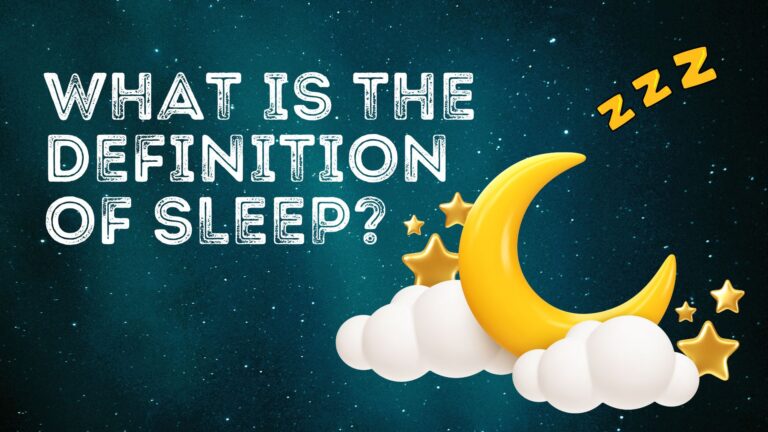Sleep is something we all experience, but its exact definition and purpose often remain a mystery to many. Though it feels like a simple state of rest, sleep is actually a complex and essential part of life. Understanding what sleep is and why it’s important can help us appreciate its role in maintaining our health and well-being.

1. What Is Sleep?
Sleep is a natural, recurring state of rest that involves reduced consciousness, decreased sensory activity, and inhibited voluntary muscle movements. While it may seem like our bodies and minds are inactive, sleep is actually a highly active process. During sleep, the brain undergoes crucial functions that help with memory consolidation, learning, physical recovery, and emotional regulation.
Key Characteristics of Sleep:
- Reduced awareness of surroundings: Unlike wakefulness, sleep lowers our conscious awareness of what’s happening around us.
- Decreased muscle activity: In deeper stages of sleep, most voluntary muscles are relaxed, preventing movement.
- Altered brain activity: The brain cycles through various stages, including periods of deep sleep and lighter REM (Rapid Eye Movement) sleep, during which dreaming often occurs.
2. The Stages of Sleep
Sleep isn’t a single, uniform state but rather a series of stages that cycle throughout the night. These stages are generally divided into two main categories: Non-REM and REM sleep.
Non-REM Sleep
Non-REM sleep consists of three stages that range from light to deep sleep:
- Stage 1: This is the lightest stage of sleep, where you transition from being awake to sleeping. Your muscles relax, and your heartbeat and breathing slow down.
- Stage 2: A deeper form of light sleep, Stage 2 is when your body temperature drops, and your heart rate and breathing become even more regular.
- Stage 3: Often called “deep sleep,” this stage is essential for physical recovery. During this time, tissue growth and repair occur, and your immune system strengthens.
REM Sleep
REM sleep is the stage where most dreaming occurs. It is characterized by rapid eye movements, increased brain activity, and temporarily paralyzed muscles (except for those that control breathing and eye movements). REM sleep is critical for mental and emotional health, as well as memory consolidation.

3. Why Is Sleep Important?
Sleep is vital for our physical, mental, and emotional health. Without enough quality sleep, we can experience a wide range of negative effects, including poor concentration, mood swings, and a weakened immune system.
Benefits of Sleep:
- Memory and Learning: Sleep helps consolidate memories and reinforces learning from the day. It’s crucial for cognitive functions such as problem-solving and creativity.
- Physical Health: During deep sleep, the body repairs tissues, builds muscles, and strengthens the immune system.
- Emotional Well-being: Sleep plays a role in regulating emotions and mood. Poor sleep is linked to increased stress, anxiety, and even depression.
- Energy Restoration: Sleep restores energy levels, allowing you to feel refreshed and alert upon waking.
4. What Happens When You Don’t Get Enough Sleep?
Not getting enough sleep, or experiencing poor-quality sleep, can lead to a condition known as sleep deprivation. Sleep deprivation can negatively impact nearly every system in the body, including your brain, heart, immune system, and mental health.
Short-Term Effects:
- Fatigue and irritability: Feeling tired and short-tempered throughout the day is common after a poor night’s sleep.
- Cognitive impairments: Lack of sleep affects your ability to focus, make decisions, and remember information.
- Decreased physical performance: Sleep deprivation can impair coordination, reaction times, and overall physical endurance.
Long-Term Effects:
- Chronic health problems: Long-term sleep deprivation increases the risk of serious conditions like heart disease, diabetes, and obesity.
- Mental health issues: Persistent lack of sleep is linked to mood disorders, including depression and anxiety.
- Weakened immune system: Without adequate sleep, your body is less capable of fighting off infections and recovering from illness.

5. How Much Sleep Do We Need?
The amount of sleep you need varies by age and individual needs. However, general guidelines recommend the following:
- Newborns (0-3 months): 14-17 hours per day
- Infants (4-11 months): 12-15 hours per day
- Toddlers (1-2 years): 11-14 hours per day
- Preschoolers (3-5 years): 10-13 hours per day
- School-age children (6-13 years): 9-11 hours per night
- Teenagers (14-17 years): 8-10 hours per night
- Adults (18-64 years): 7-9 hours per night
- Older adults (65+ years): 7-8 hours per night
6. The Science Behind Sleep
The Circadian Rhythm
Our sleep-wake cycle is governed by the circadian rhythm, which is a natural, internal process that regulates the timing of sleep. This rhythm follows a roughly 24-hour cycle and is influenced by factors such as light and darkness. The hormone melatonin plays a key role in this process, as it is released in response to darkness and helps signal that it’s time to sleep.
Sleep Disorders
Sleep disorders, such as insomnia, sleep apnea, and restless leg syndrome, can severely disrupt the quality and quantity of sleep. If you’re experiencing persistent trouble with sleep, it’s essential to seek medical advice to identify potential sleep disorders and explore treatment options.
Conclusion
Sleep is far more than just a period of rest; it is an essential biological process that supports every aspect of our health. Understanding what sleep is and why it matters can empower you to make changes that improve your sleep quality. From following a consistent sleep schedule to creating a sleep-friendly environment, small adjustments can lead to big improvements in how well you rest.
FAQs
Can naps help if I don’t get enough sleep at night?
Short naps (10-30 minutes) can improve alertness and mood, but they shouldn’t be a substitute for proper nighttime sleep.
How can I improve my sleep quality?
To improve sleep quality, establish a regular sleep routine, limit screen time before bed, avoid caffeine late in the day, and create a comfortable sleeping environment.
What is insomnia?
Insomnia is a sleep disorder characterized by difficulty falling asleep, staying asleep, or waking up too early. It can be caused by stress, anxiety, or other factors.
Why do we dream?
Dreaming occurs mainly during REM sleep and is thought to help with emotional processing, memory consolidation, and problem-solving, though the exact purpose of dreams is still not fully understood.


